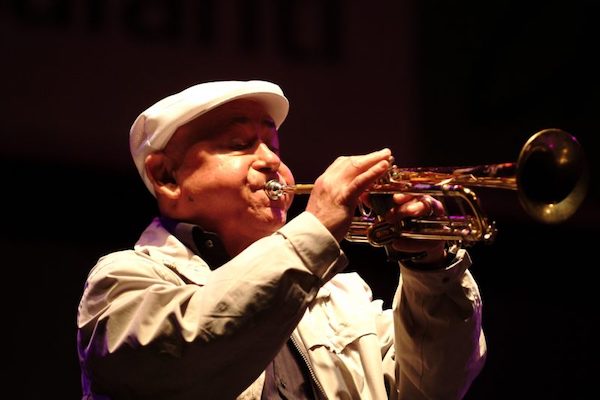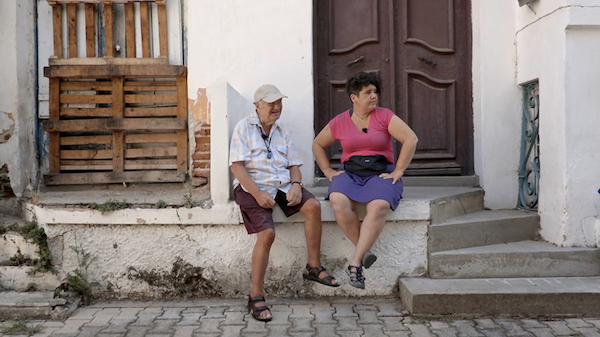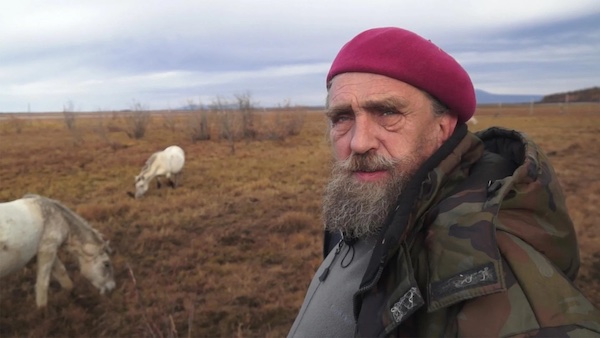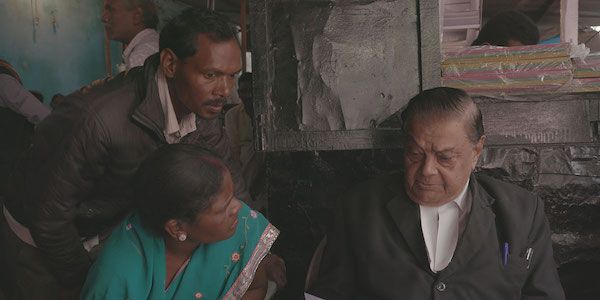Doc Talk: Two Boston-Area Film Festivals — The Strength of Community
By Peter Keough
There’s no place like home at two local film festivals.
As demonstrated by the four documentaries in these two Boston-area film festivals, the concept of home transcends national borders, religious differences, and political divisions. From Siberia to Sweden, from India to Istanbul, these films affirm the universal impulse to seek the security and identity of a nurturing community.

Trumpeter Maffy Falay in action. Photo: Wiki Common
22nd Annual Boston Turkish Film Festival (March 24-26 in person at the Museum of Fine Arts March 27-April 9 online; full disclosure: I’ll be moderating the discussions following the screenings).
Muvaffak “Maffy” Falay, the brilliant trumpet player who is the subject of Deniz Yüksel Abalıoğlu’s subtle and heartbreaking Maffy’s Jazz (2022; screens with Patrida March 25 at 2 p.m. followed by a Q & A with the directors), left Turkey in the ’60s and ultimately settled in Sweden because his true homeland was Jazz. Turkey just didn’t dig it. By the late ’80s, though, it seems neither did Sweden. A symbolic sign of the times: a member of the band Abba bought the Stockholm club where Maffy and his pals used to hang out and jam.
Now he hardly emerges from his apartment where he busies himself surrounded by detritus from the past – photos of him with jazz greats Dizzy Gillespie and others, old record albums, newspaper clippings, piles of music. He watches TV and plays on his keyboard because he finds his mouth is getting too weak to play the horn. But in his heyday, as seen in the film’s rich selection of archival clips, Maffy was some kind of jazz great himself. Not just when he shared the stage with Quincy Jones, Kenny Clarke, and others, but when he lead his own ’70s band Sevda with its ebullient, driving fusion of jazz and traditional Turkish music.
Abalıoğlu, a gentle but acutely observant presence, joins Maffy as he reminisces, puts crumbs on the windowsill for the birds, or prepares for a performance at a local club. It will prove to be his last. Though he said he would never return to Turkey, he would spend his last years there, dying in February 2022 at 91. But as the film’s final epigraph puts it, “He never truly found his home.”

A scene from Patrida.
Ayça Damgacı’s father İsmet chose an opposite path to Maffy’s. As seen in Damgacı and Tümay Göktepe’s Patrida (2021; screens with Maffy’s Jazz March 25 at 2 p.m. followed by a Q&A with the directors), he spent his first 16 years in Zurich where his father emigrated from Turkey to work in a tobacco warehouse. Here İsmet thrived academically and socially — at age 87 he still takes pride in his perfect Swiss German. But this paradise ended when his father came down with a work-related illness and his employers refused to support him, their adopted country refused to treat him, and they were ignominiously deported back to Turkey. His father died shortly thereafter, but because of the education he received in Switzerland the repatriated İsmet was able to adapt and succeed.
Consequently he has ambivalent feelings about Switzerland, which he feels both epitomizes civilization and harbors a cruel and selfish people. He at times regards it as his homeland (the title of the film is Greek for “homeland”) — but then he has many homelands. Born in Greece, descended from a grandfather İsmet describes as a “Yuruk,” he is proud of what he sees as his pure “West Thracian” blood.
These convictions, with his Eurocentric prejudices and anti-Asian, anti-Anatolian inclinations, makes for a strange but tenacious chauvinism. Not that he is obnoxious about it — he is indeed a jovial, charming guy. But, in her occasional dismayed reaction shots and acerbic voice-over asides, Damgacı indicates her disapproval of some of his attitudes, suggesting that growing up with him might have been a challenge.
To reconnect İsmet with his various roots Damgaci has convinced him and her mother to go on an Odyssey of sorts, leaving Istanbul to visit her father’s birthplace in the small town of Xanthi, then visiting Thessaloniki where his grandfather was born, and finally returning to the lost Eden of Zurich. Along the way İsmet shows discomfort when they are in the company of strangers he perceives as threatening – young refugees from Syria, Iraq, Kurdistan, and other troubled places. Weren’t you once a displaced person and asylum seeker yourself? Damgacı, who engages with these wanderers, asks him. He agrees, but it isn’t until he meets a young man from Niger in Zurich who also speaks perfect German that he seems to mollify his preconceptions. In the end, Damgacı says ruefully, “The whole world is a foreign country to me… Do I owe this all to you, father?”
Salem Film Fest (in person and virtual March 23-April 2)
For Sergey Zimov and his son Nikita, home might be the entire planet, a frail eco-system threatened by climate change and with no concerted efforts being made to save it. Sergey thinks that the situation is even worse than the most pessimistic scientists have speculated – he has discovered that the permafrost in the frozen North regions is melting and releasing billions of tons of methane gas.

A scene from Pleistocene Park.
He has a plan that he thinks can solve the problem but as he mentions at the start of Luke Griswold-Tergis’s laid-back and sardonic Pleistocene Park (2022; screens March 26 at 2:40 p.m. at the Peabody Essex Museum followed by a Q&A with the director; it also streams online March 27), he’ll need about 200 million horses, yaks, bison, and other large herbivores to do it. He argues that when these animals graze on the grasslands (all the trees will have to be cut down meanwhile) it will transform the environment into that of the Pleistocene era nearly fifteen thousand years ago when herds of mammoths roamed and the region was all savannah-like steppes. Through processes too complicated and arcane (for me) to explain (check the Zimovs’ website for more detail), this will reverse the permafrost loss and the ongoing climate change.
Unsurprisingly, no government or other deep-pocketed organization has been willing in underwriting Sergey’s proposal so he has gone ahead to undertake the project on his own. He’s set aside a parcel of land just off the coast of the East Siberian Sea near Nizhnekolymsk in the Sakha Republic. The location is so far away from everything that the closest major city may be in the US – Anchorage, Alaska. In this ramshackle isolation, father and son and various volunteers try to gather together the beginnings of the requisite herd. It’s been rough going, but they are undaunted.
Griswold-Tergis, who brings a kind of hipster Michael Moore-ish presence to the film, is skeptical, though still game enough to film the project for several years, recording their misadventures as they try to gather animals with absurd and frustrating results. He even helps out by shoveling yak crap and performing other menial tasks when called upon. You might say that making the film is his own futile, unending project. In fact, Pleistocene Park is his home away from home – while making the movie he met and married his Russian wife.
Unlike Zimov’s endeavor, though, Griswold-Tergis’s film has been completed, and it possesses the kind of wacky charm and quotidian absurdity that you’ll find in some early documentaries by Errol Morris and Werner Herzog. As for the Park itself and the Zimovs’ plan, the future looks dim, what with the impact from Putin’s equally quixotic, but utterly malignant misadventure in Ukraine.

A scene from To Kill a Tiger.
The family in Nisha Pahuja’s straightforward but harrowing To Kill a Tiger (2022; screens March 26 at 12 p.m. at the Cinema Salem followed by a Q & A with the director) were free to feel at home in their rustic village in the state of Jharkhand in eastern India. All they had to do was agree to marry their 13-year-old daughter to one of the three young men who raped her.
They refuse. Instead they have the young men arrested and enlist the aid of an activist group. They resist the community’s pressure, threats, and ostracism as the torturous judicial process unfolds. The ordeal takes its toll and the culture of patriarchal misogyny looks likely to prevail.
Torn by guilt, shame, and frustration, the father starts drinking. He misses some court appearances. A mob of irate women storms his house and menaces the film crew. But inspired by the courage and resilience of the victim, who starts out broken and cowed and ends up testifying in court with grace, cogency, and passion, they persevere. Their village again becomes their home, and a safer place for the innocent and vulnerable.
Peter Keough writes about film and other topics and has contributed to numerous publications. He had been the film editor of the Boston Phoenix from 1989 to its demise in 2013 and has edited three books on film, most recently For Kids of All Ages: The National Society of Film Critics on Children’s Movies (Rowman & Littlefield, 2019).
